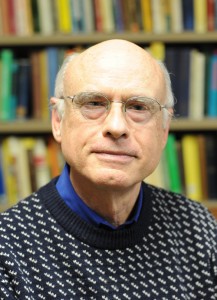5 Questions With … Rick Elphick on Missionaries and the Racial Politics of South Africa

In this edition of The Wesleyan Connection, we ask “5 Questions” of Richard “Rick” Elphick, professor of history and co-chair of the College of Social Studies. Elphick is the author of The Equality of Believers: Protestant Missionaries and the Racial Politics of South Africa, published by the University of Virginia Press in September 2012.
Q: What do you think is the main message, or the main achievement, of your new book?
A: For decades, historians of South Africa have struggled to trace how a white minority, starting in the 1650s, established a system of stark inequality among the races in the region. My book attempts to reconfigure the history of South Africa by interweaving the pressures toward inequality, which are now fairly well understood, with an account of the pressures toward racial equality. These pressures, I argue, were rooted chiefly in the proclamation of the equality of all persons before God, a message brought to South Africa by Christian missionaries. My story begins with the first missionary in 1737, and ends in 1960.
Q: Do you give the missionaries credit for the eventual overthrow of white rule and apartheid in the 1990s?
A: Not really. I do give credit to the mission schools, where black leaders, almost all of them devout Christians, acquired a belief in racial equality that inspired their resistance to oppression. I also emphasize how Christian doctrine ate away at the conscience of some white South Africans. But, as for the missionaries themselves, many appear in my book as deeply conflicted between their theoretical ideals and their fear of confronting the white power structure. And many showed a lack of confidence in blacks that bordered on racism.
Q: You also say that missionaries helped create the apartheid ideology?
A: Many writers have tried to find a link between religion and the doctrine of radical racial separation known as apartheid. In my view, however, they have looked in the wrong places. I trace the origins of the doctrine to missionary leaders of the Dutch Reformed Church. This very powerful church was devoted to the welfare and uplift of the white Afrikaners, the descendants of Dutch settlers, but it also had a deep emotional commitment to conversion and uplift of blacks. The apartheid doctrine was an attempt of missionary leaders to square the circle—to allow the church to advocate protection of whites from black competition, while still seeking the welfare of blacks—because, under apartheid doctrine, whites and blacks would develop and flourish in their separate spheres.
Q: What inspired you to write about this topic?
A: In the 1970s and 1980s, on regular visits to South Africa, I came to know many white opponents of the government and Afrikaner intellectuals who were struggling with their conscience over the injustices of apartheid. These so-called “liberals” were much excoriated by Marxists and radicals for their moderation and ineffectiveness. But I tended to admire them. I also became interested in understanding the source of their dissent from the general views of white South Africans, a dissent often rooted in Christian beliefs. In 1986, in the midst of violent upheaval, Wesleyan and the University of Cape Town held a conference in South Africa on democratic liberalism, with Wesleyan President Colin Campbell in attendance. My interest in the history of the liberal movement—and its roots in Christian missions—was greatly stimulated by that event.
Q: Does the message of your book have any relevance beyond the community of scholars of South African history?
A: I imagine that it might. On one hand, the story of apartheid shows how decent people, starting with good intentions, can cause incredible evil. On the other hand, the triumph of ideals of racial equality in South Africa shows how astounding good can emerge from the actions of people with imperfect, mixed, or even downright selfish motives. If you like, you can call that the redemptive work of God in history—not a claim that I make in the book, of course, but one that I wouldn’t reject out of hand.

